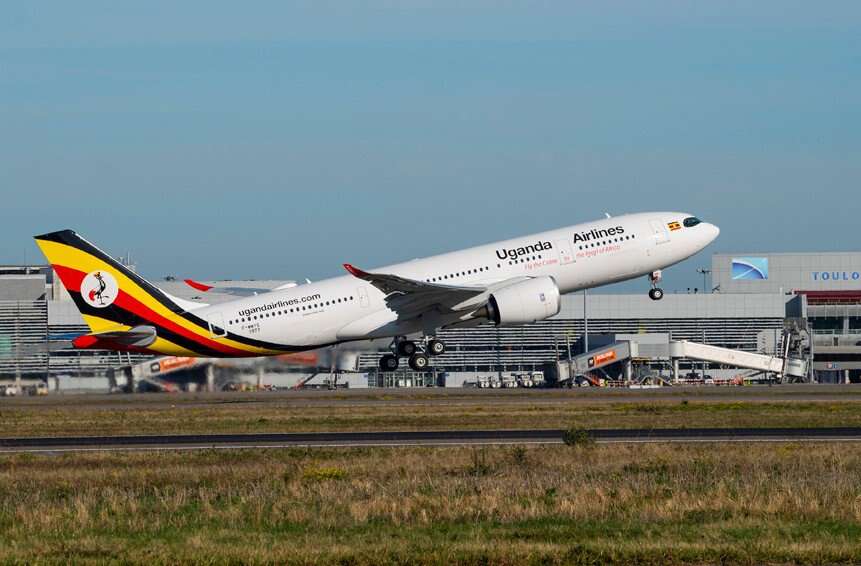Uganda Airlines Allocates $95M to Boost Local Purchases; Kenya Opens Market for Duty-Free EU Imports Following Trade Deal
Uganda Airlines has ambitious plans for the 2024/25 fiscal year, with a significant $95 million earmarked for procurement. This substantial investment will be allocated across various sectors, including supplies, services, and works, as part of the airline’s strategic efforts to bolster its operations and expand its network. The national carrier is not only focusing on enhancing its service offerings but is also keen on supporting local suppliers to ensure that a larger portion of this expenditure benefits the local economy. This initiative was underscored during the airline’s first supplier forum in Kampala, where CEO Jenifer Bamuturaki emphasized the importance of local suppliers meeting international quality and consistency standards.
The airline’s procurement strategy is aimed at fostering growth and competitiveness among local businesses. With a local supplier database that has grown to 200, Uganda Airlines has already paid out Ush120 billion (approximately $32.3 million) in local contracts over the past five years. Despite these investments, Bamuturaki pointed out challenges related to the quality and consistency of locally sourced products. She stressed that local suppliers must improve to become globally competitive, thereby not only supporting Uganda Airlines but also contributing to the national export base and overall economic development.

One key area of focus for Uganda Airlines is onboard consumables, with 90 percent sourced from local suppliers. As the airline expands its network and increases passenger numbers, the demand for these consumables is expected to rise, creating more opportunities for local suppliers. Bamuturaki highlighted the need for suppliers to concentrate on enhancing quality, particularly in packaging and consistency, to meet the airline’s standards and support its growth ambitions.
In terms of operational performance, Uganda Airlines is set to achieve a milestone of carrying 700,000 passengers by the end of 2024, up from an estimated 480,000 in the 2023/24 fiscal year. This growth is driven by several factors, including network development, increased flight frequencies on key routes, and capacity enhancements through the introduction of new aircraft. In May 2024, the airline added a leased 156-seat Airbus A320 to its fleet, which has enabled it to tap into growing demand on routes such as Nairobi, Kinshasa, and Johannesburg. This addition also facilitates increased flight frequencies, providing more options for passengers and boosting the airline’s overall capacity.
The airline’s route network has seen significant adjustments to accommodate growing demand and improve service efficiency. For instance, flights to Nairobi will increase to 16 times a week, with three flights daily for six days, excluding Saturdays. Kinshasa will see an increase from five to six flights per week, while Juba will have double daily flights for four days, totaling nine weekly flights. Additionally, Dar es Salaam will now operate daily flights, up from the current five weekly flights, and Zanzibar will be coupled with Kilimanjaro, with both destinations served three times a week.
Bamuturaki reiterated the airline’s commitment to working with local suppliers, encouraging them to expand the range of products they can supply on competitive terms. She urged suppliers to focus on improving quality to meet the airline’s standards and support its vision of launching a dedicated freighter service. The success of local suppliers is seen as integral to the airline’s sustainable growth, as they will help fill the cargo capacity and contribute to the broader goal of national economic development.
Furthermore, the airline’s growth trajectory is supported by a robust network development strategy, which currently includes 13 destinations. The increase in flight frequencies and capacity growth is expected to enhance connectivity and provide passengers with more travel options. The addition of the Airbus A320 has been a crucial element in this strategy, allowing the airline to cater to increased demand and improve operational efficiency on regional routes.
Uganda Airlines’ $95 million procurement plan for the 2024/25 fiscal year represents a significant investment in its operational and service expansion. By focusing on supporting local suppliers and enhancing quality standards, the airline aims to foster sustainable growth and contribute to the national export base. With ambitious passenger growth targets and strategic network development, Uganda Airlines is well-positioned to strengthen its presence in the region and support the broader economic goals of Uganda.
Kenya to Open Market for Duty-Free Imports from EU Following Trade Agreement Implementation
Kenya and the European Union have successfully enacted the Economic Partnership Agreement (EPA) after a decade of negotiations, paving the way for duty-free imports from the EU and maintaining unrestricted access for Kenyan goods to the EU market for the next 25 years. This landmark agreement is considered one of the most ambitious between the EU and an African nation, aimed at promoting economic sustainability and development cooperation.

Rebecca Miano, Kenya’s Cabinet Secretary for Investment, Trade, and Industry, highlighted the agreement’s significance, stating that it serves as a template for other African countries, particularly in Eastern Africa, to adopt. The EPA includes provisions on labor issues, gender equality, forestry, environment, and climate change, reflecting the EU’s modern approach to trade and sustainable development.
Under this agreement, Kenya’s agricultural exports, including vegetables, cut flowers, fruits, tea, and coffee, will continue to enter the EU market duty-free and without quotas. On the other hand, Kenya will gradually reduce duties on imports from Europe, which will be fully liberalized over 25 years. This means that European goods, such as machinery, mineral, and chemical products, will eventually enter Kenya duty-free, while EU investments in Kenya will be incentivized.
One of the critical aspects of the agreement is a protectionist clause designed to safeguard Kenya’s agricultural sector. This clause prevents the EU from applying blanket subsidies to its agricultural exports to Kenya without a comprehensive policy dialogue with Nairobi. This measure aims to protect Kenyan agriculture and food security from unfair competition.
The EPA is an evolution of the earlier EU-East African Community (EAC) pact, which stalled due to lack of consensus among EAC members. Unlike Kenya, other EAC countries benefit from the “everything but arms” arrangement, exempting them from higher tariffs on exports to the EU. The refusal of some EAC countries to endorse the earlier pact led Kenya to negotiate a temporary special arrangement with the EU, allowing its exports to continue accessing the EU market duty-free.
Trade between the EU and Kenya was estimated at €3.3 billion in 2022, showcasing the significant economic relationship between the two entities. The EPA is expected to further boost this trade, enhancing Kenya’s economic development and integrating it more deeply into the global market.
Kenya trade with EU

Kenya and the European Union have officially enforced their Economic Partnership Agreement (EPA) after a decade of negotiations, opening Kenya’s market to duty-free goods from the EU over a span of 25 years. This landmark agreement, effective from February 29, 2024, ensures that Kenyan exports, including vegetables, cut flowers, fruits, tea, and coffee, continue to access the EU market without tariffs or quotas. The EU imports from Kenya, valued at €1.2 billion, predominantly consist of agricultural products, while EU exports to Kenya, worth €2.02 billion, mainly include machinery and chemical products.
The European Parliament approved the deal with a vote of 366 in favor, 86 against, and 56 abstentions, marking a significant step forward. Kenya’s lawmakers also ratified the document, ensuring its enforceability. The EPA is heralded as one of the most ambitious agreements between the EU and an African nation, incorporating comprehensive provisions on trade, sustainable development, labor issues, gender equality, forestry, and climate change.
Rebecca Miano, Kenya’s Cabinet Secretary for Investment, Trade, and Industry, highlighted the EPA as a template for other African countries, particularly in Eastern Africa. The agreement promotes economic sustainability and development cooperation, aiming to foster economic growth, job creation, and improved living standards in Kenya.
This agreement is particularly crucial for Kenya as it transitions from being a lower-middle-income country, necessitating such deals to maintain its duty-free access to the EU market. The other East African Community (EAC) countries, which are least-developed countries, continue to enjoy similar access under the “everything but arms” arrangement.
The deal includes a protectionist clause to prevent the EU from applying blanket subsidies to agricultural exports to Kenya without deepened policy dialogue, safeguarding Kenya’s agriculture and food security.
This EPA is not only about trade but also about creating sustainable economic opportunities and enhancing Kenya’s development prospects. It leaves the door open for other EAC member states to join in the future, promoting regional economic integration.
Read More ETHIOPIA, SOUTH SUDAN TO BUILD 220KM CROSS-BORDER ROAD; UGANDA REINSTATES TAX ON ELECTRIC VEHICLES




